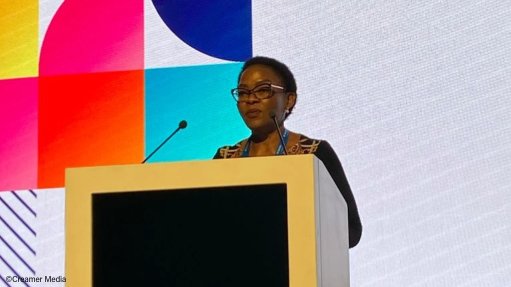
Deputy Minister for Public Service and Administration, in the Presidency, Pinky Sharon Kekane, addressing the 2025 Women in the Green Economy breakfast
Photo by: Creamer Media/Chloe Cormack
“Our planet is at a crossroads,” affirmed Presidency Public Service and Administration Deputy Minister Pinky Sharon Kekane in an address at the Women in the Green Economy breakfast, at Africa’s Green Economy Summit, at the Century City Convention Centre in Cape Town, on Thursday. “Climate change is a reality that we face.”
The challenges posed by climate change and environmental degradation had to be addressed, she highlighted. But the green transition was not just an environmental need, it was also an economic necessity.
Traditionally, across Africa and the world, women had been the stewards of the environment, she stated. But women had often also borne the brunt of environmental degradation.
Today, women were engineers, entrepreneurs and innovators across the green economy. Women were using technology to develop climate-smart solutions. She referenced different women-led initiatives in Kenya, Morocco and Nigeria that were, in different sectors and in different ways, cutting carbon emissions and countering environmental degradation.
“Across the world, women have been at the forefront of green innovation,” she pointed out. “Women are leading groundbreaking initiatives that are transforming the economy.”
“Women have been historically underrepresented in key economics sectors,” she noted. She referenced past experience in South Africa. Recycling in the country had been started by women, but when it became monetised, it was taken over by men.
It was necessary to promote women-led green businesses in South Africa. “How do we utilise the African Continental Free Trade Area?”
The South African government recognised the need to support women-led green businesses, she assured. But women should not only be the recipients of funding, they should be involved in deciding how it was allocated.
She focused in on one particular element of green business – waste management. The government, she pointed out, had a Waste Management Master Plan. Among other things, this aimed at stimulating local economies around landfill sites. One of its intentions was to integrate informal waste pickers (recyclers) into the formal economy. Many of these pickers were women. ![]()